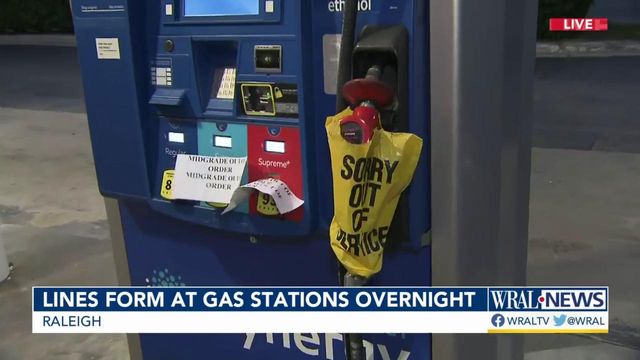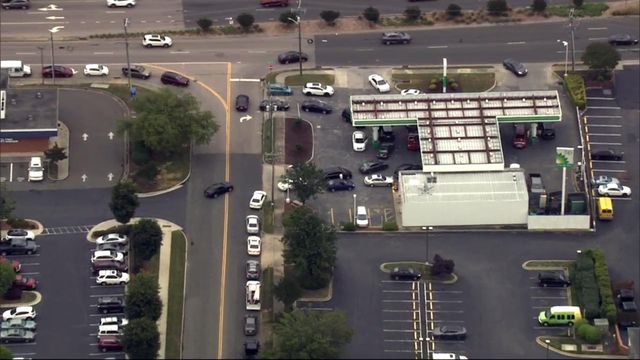As more pumps run dry, NC officials plead with drivers not to gas up unless necessary
Panicky drivers waited in lines at gas stations across the region for a second day on Wednesday, trying to fill their tanks with a limited supply of gas as a major interstate pipeline remained offline.
Posted — UpdatedThe Colonial Pipeline, which supplies about 40 percent of the gas for the East Coast and nearly all of the supply for eastern North Carolina, has been shut down since last weekend following a cyberattack. Company officials said Wednesday evening that they have restarted operations, and they expect the supply chain will return to normal in "several days."
"Some markets served by Colonial Pipeline may experience, or continue to experience, intermittent service interruptions during the start-up period. Colonial will move as much gasoline, diesel, and jet fuel as is safely possible and will continue to do so until markets return to normal," the company said in a statement.
Online site GasBuddy.com reported that 70 percent of North Carolina gas stations reported being out of fuel on Wednesday evening – by far the largest impact across the Southeast. Virginia was at 53 percent of stations empty, while South Carolina was at 49 percent and Georgia was at 47 percent.
On Wednesday morning, GasBuddy reported that 72 percent of stations in the Raleigh area had no gas available.
Claudia Franco said she searched for gas for two days before being able to fill up at a station on Western Boulevard in Raleigh on Wednesday, where people waited in line for an hour.
"All of the gas stations are empty. I went to Knightdale, then Raleigh," Franco said. "I am lucky I found this. I was very, very worried."
A second station on Western Boulevard got a shipment of gas around midnight, and people were lined up to fill up by 3 a.m., including delivery drivers and police officers. By 6 a.m., the station was out of gas.
Lines of cars snaking through parking lots or stretching out into streets were common sights at stations on Wednesday.
Like Franco, Bill Morrissey called finding a working gas pump on Wednesday "pure luck."
Morrissey works for Charlotte-based Warco Construction, and his crew is on a project in Raleigh. He wanted to make sure they had enough gas to get home.
Gov. Roy Cooper implored people not to buy gas unless absolutely necessary.
"The shortages that we’re seeing are pretty much solely related to panic buying from people, and I want to encourage people not to do that. Don’t fill up your car unless you have to. Don’t go top off your car," Cooper said during a Wednesday morning stop in Durham. "It’s not a supply issue."
Duke University professor Dan Ariely said such messages are lost amid the images and anecdotes of long gas lines.
"We have a little fear augmented by what we’re seeing, and then we get more stressed, and then we get more gas," said Ariely, who studies people's economic behavior and what motivates it.
"The more somebody says 'Don’t panic buy! Don’t panic buy!' they think, 'Maybe it’s a bigger problem than I thought,'" he said. "It’s very hard to trust people’s goodwill. It’s very hard to create a message that would not increase excitement."
Instead, Ariely said, the governor should give state residents some rules to follow, such as carpooling or using public transit to save gas or to fill up only if you're below a half-tank.
"We could say something like, 'Sorry, it’s an emergency. We’re limiting it to 10 gallons per person,'" he said.
Although some stations were limiting how much gas customers could buy, Cooper said he has no plans to implement gas rationing in North Carolina.
"We’re hoping that the people of North Carolina will do the right thing," he said. "We’re working with local gas stations to make sure that public safety, that there is fuel reserved for public safety throughout the state."
Fred Lee, who owns T.R. Lee & Gas in Clayton, said he was pumping gas for people and stopping when they hit $15.
"[We're] trying to let it go two or three days instead of just one day and out,” Lee said.
But the station still ran out by Wednesday afternoon.
Some people, in addition to filling up their cars, were seen at various stations filling multiple cans in their trunks as well on Wednesday.
"You got some inconsiderate people. They’re not taking into consideration that everybody needs gas," said Anthony McNeill, of Raleigh, who said the governor should limit people's gas purchases.
Lee said the only other time he can remember such a frenzy to fill up was during the Arab oil embargo in the early 1970s.
"They were lined up to the stoplight. We had a shortage then,” he said.
The governor declared a state of emergency over the pipeline shutdown on Monday, easing rules for tanker drivers to help boost gasoline supplies across the state. The U.S. Environmental Protection Agency also issued a waiver for North Carolina and 11 other states on Tuesday to allow lower-grade fuel to the marketplace temporarily, which also would expand available supplies.
Attorney General Josh Stein said his office has received nearly 400 complaints of price gouging by gas stations – Cooper's emergency declaration also put the state's price gouging law into effect – since Tuesday. Stations are allowed to raise prices if their costs have gone up to bring in more gas, he said.
"What we do not want to see is for gas stations to take advantage of people's desperation and raise their prices unjustifiably based on inventory they've already paid for," Stein said.
People can report suspected price gouging to the Attorney General's Office at 877-5-NO-SCAM.
Stein echoed Cooper in urging people not to hoard gas, saying the gas "crisis" was self-created by people filling up when they don't need to.
"If you have enough [gas] for the next few days of your lives, just don't go to the gas station," he said, comparing the situation to the shortage of toilet paper during the early days of the pandemic last year.
A large part of the Colonial Pipeline resumed operations manually late Monday. Colonial had delivered around 967,000 barrels of gasoline, containing about 41 million gallons, to markets like Charlotte and Greensboro by late Tuesday.
One of the busiest pickup spots for fuel distributors along the 5,500-mile pipeline is in Selma, where there was a flurry of activity Wednesday morning.
Related Topics
• Credits
Copyright 2024 by Capitol Broadcasting Company. All rights reserved. This material may not be published, broadcast, rewritten or redistributed.






